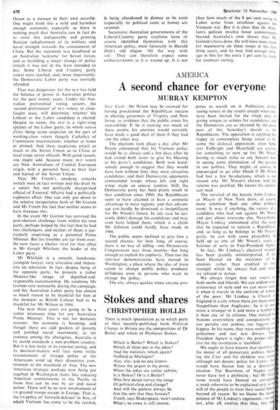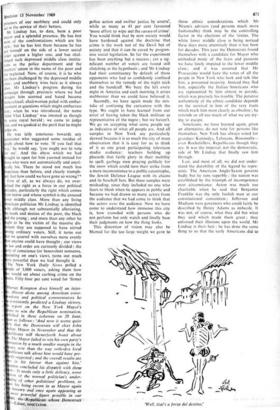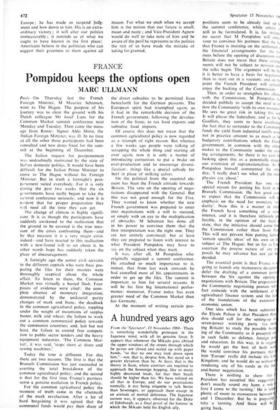AMERICA
A second chance for everyone
MURRAY KEMPTON
New York—Mr Nixon may be excused for having proclaimed the Republican success in electing governors of Virginia and New Jersey as evidence that the public trusts his stewardship. If he is making too much of these events, his enemies would certainly have made a good deal of them if they had run the other way.
The elections took place a day after Mr Nixon announced that his Vietnam policy would be as always and a few days after he had visited both states to give his blessing to his party's candidates. Both won hand- somely enough to suggest that they would have won without him; they were attractive candidates; and their Democratic opponents commanded troops whose left and right wings made an uneasy tandem. Still, the Democratic party has been pretty much in that condition since 1966; the Republicans seem to have attained at least a cosmetic advantage in most regions; and that advant- age can hardly be dismissed as insignificant for Mr Nixon's future. In any case he cer- tainly didn't damage his candidates and may even have helped them, which is a claim Mr Johnson could hardly have made in 1966.
The public seems inclined to give him a second chance; for how long, of course, there is no way of telling—one Democratic Congressman says three months—but long enough to explain his euphoria. Then too the anti-war demonstrations have moved to Washington, a place where the idea of mass action to change public policy produces diffidence even in persons who want to change the policy.
The city always quakes when anyone pro- poses to march on it. Politicians dislile seeing voters in the streets except when the% have been invited for the single duty of giving tongue to salutes for candidates: and the Democrats are as alarmed by the pros- pect of this Saturday's march as the Republicans. The opposition is anything but happy to contemplate being asked to be- come the disloyal opposition; even Sena- tors Fulbright and Mansfield are anxious for something to turn up for Mr Nixon. having as much stake as any Senator does in seeing some diminution of the passion in our politics. They might, of course, be encouraged to go after blood if Mr Nixon had lost a few by-elections, which is one reason why Mr Nixon's elation with the returns was justified. He knows his enemies can read.
The survival of the heretic John Linds.i% as Mayor of New York drew, of course, more attention than any other political event. It was, if anything, the victory of a candidate who had run against Mr Nixon and just about everyone else. Nevertheless Mayor Lindsay announced after the event that he expected to remain a Republican: and, so long as he belongs to Mr Nixon's party, he can with some plausibility be held up as one of Mr Nixon's assets, a balance of sorts to Vice-President Agnew.
In fact, Mr Lindsay's electoral triumph has been grandly misinterpreted. It has been blamed on the weakness of his enemies rather than credited to that strength which he always had and which we refused to notice.
We always forget that our voters are both snobs and liberals. We can seldom resist aristocracy of style and we can never resist it when it travels in the uniform of tribune of the poor. Mr Lindsay is Church of England in a city where there are many more Neapolitans than Anglicans ; he is at once more a stranger to it and more a symbol of it than any of its citizens. One noticed his buttons everywhere and conspicuously on our pariahs, our junkies, our faggots, our hippies. In his name, they were snubbing OUT policemen and our taxi drivers. Vice' President Agnew is right ; the proper adjec- tive for the revolution is 'snobbish'.
We ought to have known that snobbery IS the motor of all democratic politics. Shoot ing the Czar and his children was sound. although not decent, policy for Lenin : th would have beaten him in a democra election. The Bourbons of Naples couW never have lost a plebiscite ; but Mr Gia stone would have blamed on corrupt'
a result otherwise to be explained only as t will of the people to trust their social ben beyond all reason. So we blame the inco petence of Mr Lindsay's opponents ; We not, after all, confess that _they, too, ■A prisoners of our snobbery and could only -act in the service of their betters. Mr Lindsay has, to date, been a poor mayor and a splendid presence. He has lost most of the confrontations which are his style ; but he has lost them because he has put himself on the side of a lower social order against a higher one, and has chal- lenged such depressed middle class institu- tions as the police department and the teachers' union in the name of the poor and the neglected. Now, of course, it is he who has been challenged by the depressed middle class ; and snobbery wins here as it always does. Mr Lindsay's progress during his campaign through precincts where we had thought him scorned and hated became monarchical; chairwomen paled with embar- rassment at questions which might embarrass him; when he was introduced, the name 'John Vliet Lindsay' was intoned as though y some royal herald ; we came to judge im, and we quaked at the peril that he might udge us.
He was icily courteous towards any uestioner who suggested some residue of oubt about how to vote. 'If you feel that .ay,' he would say, 'you ought not to vote or me'. And the abyss which we had ought to open for him yawned instead for ose who were not automatically and uncri- cally his. There he stood not much less perious than before, and clearly trumph- nt.lust how could we have gone so wrong?* First of all, as we always do, we over- alued the right as a force in our political ttitudes, particularly the right which comes om below and whose symbol is the aroused wer middle class. More than any living merican politician Mr Lindsay is identified ith, although not substantially alleviating, e needs and desires of the poor, the black d the young ; and more than any other he ght to be the victim of the massive dis- ntent they are supposed to have stirred ong ordinary voters. Still, it turns out at we quarrel with ourselves more evenly an anyone could have thought ; our views law and order are curiously divided ; the rty of conscience (or benevolent nonsense, ending on one's view), turns out much ore powerful than we had thought it. The New York Daily News polled a pie of 3,000 voters, asking them how y would set about curbing crime on the
eets. Fifty-four per cent voted for 'firmer urray Kernpton does himself an injus- Almost alone among American corre- ndents and political commentators he consistently predicted a Lindsay victory.
report on the New York Mayor's ire to win the Republican nomination. fished in these columns on 28 June, an as follows : 'And now it seems quite
If ly that the Democrats will elect John dsay Mayor in November and that the thlicans will thenceforth boast about re his being sworn in as Mayor again January and once again appearing as most powerful figure possible in our
the -Republican whom. Democrats --Editor, SPECTATOR.
police action and swifter justice by courts', while as many as 43 per cent favoured 'more effort to wipe out the causes of crime'. You would think that by now society would have hardened against the doctrine that crime is the work not of the Devil but of society and that it can be cured by progres- sive social legislation. So far the experiment has been anything but a success ; yet a sig- nificant number of voters are found still clutching at the hypothesis ; and Mr Lindsay had their constituency by default of those opponents who had so confidently confined themselves to the remedy of the night stick and the handcuff. We bury the left every night in America and each morning it arises stubborner than we could have believed it.
Secondly, we have again made the mis- take of confusing the caricature with the type. We ought to have learned from our error of having taken the black militant as representative of the negro ; but we haven't. We go on accepting what some people say as indicative of what all people are. And all samples in New York are particularly skewed because it is so much the city of mass observation that it is easy for us to think of it as one great participating television studio audience: teachers holding up placards that fairly glory in their inability to spell, garbage men praying publicly for the snow which could turn their strike from a mere inconvenience to a public catastrophe, the Jewish Defence League with its chains and its baseball bats. But these samples were misleading, since they included no one who fears to blush when he appears in public and because we had drawn so many actors from the audience that we had come to think that the actors were the audience. Now we have come to understand how immense this city is, how crowded with persons who do not perform but only watch and finally base their judgments on how the thing looks.
This distortion of vision may also be blamed for the too large weight we gave to those ethnic considerations which Mr Nixon's advisers (and persons much more fashionable) think may be the controlling factor in the elections of the 'sixties. The white lower middle class is being noticed these days more attentively than it has been for decades. This year the Democrats found themselves with a candidate for Mayor who embodied many of the fears and passions we have lately imputed to the lower middle class ; and it was assumed that Mr Procaccino would have the votes of all the people in New York who look and talk like him, a presumed majority. Instead they fled him, especially the Italian-Americans who are represented by him almost in parody, which was precisely his trouble. The putative authenticity of the ethnic candidate depends on the survival in him of the very traits which mark him most clearly as obsolete ; he reminds us all too much of what we are try- ing to escape.
Americans, we have learned again, given an alternative, do not vote for persons like themselves. New York has always voted for grandees: Kennedys, Lehmans, Roosevelts- even Rockefellers, Republicans though they are. It was the imperial, not the democratic, side of Mr Lindsay that finally saw him through.
Last, and most of all, we did not under- stand the durability of the legend he repre- sents. The American Anglo-Saxon governs badly but he runs superbly ; the nation was established by the triumph of incompetence over circumstance. Acton was much too charitable when he said that Benjamin Franklin was the only foolish man at our constitutional convention ; Jefferson and Madison were governors who could fairly be described by Henry Adams as imbecile. It was not, of course, what they did but what they said which made them great ; they enforced their illusions upon the world. Mr Lindsay is their heir ; he has done the same thing to us that the early Americans did to
Europe ; he has made us suspend judg- ment and bow down to him. His is an extra- ordinary victory ; it will alter our politics immeasurably ; it reminds us of what we ought to have known in the first place: Americans believe in the politician who can suggest their greatness to them against all reason. For what we snub when we accept him is the notion that our future is small, mean and nasty ; and Vice-President Agnew would do well to take note of him and be aware of the peril he represents to the politics the rest of us have made the mistake of taking for granted.








































 Previous page
Previous page